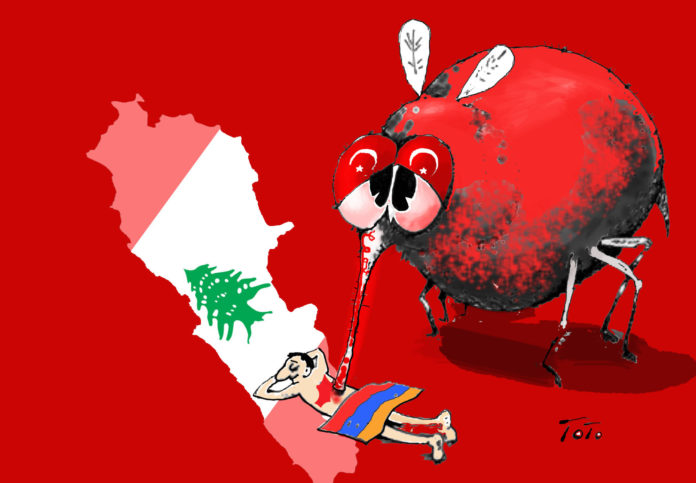While the population in Armenia is experiencing a crisis within a crisis, meaning political instability during the coronavirus pandemic, Armenians in Lebanon are facing a triple crisis: an economic meltdown during the pandemic in addition to a conflict with Turkish surrogates.
On June 11, a demonstration was staged in Beirut’s Muslim quarter, with slogans directed against Armenians, accompanied by the waving of the Turkish and Lebanese flags. This was a surprise outburst against the Armenians, although it had long been anticipated within the perspective of geostrategic developments in the region.
At the turn of the previous century, Armenians were welcomed in Lebanon after the Genocide as the indigenous people of the country, both Muslim and Christian, had themselves experienced 400 years of harsh Ottoman rule.
While Armenian political and intellectual figures lost their lives on the gallows in Istanbul, the intellectual elite in Damascus and Beirut suffered the same fate. To this day, the main square in Beirut is called Martyrs Square, where the intellectuals of what was then called Greater Syria were hanged in 1915. (On a side note, the last Ottoman governor of Lebanon was an ethnic Armenian called Hovhannes Kuyumjian.)
Therefore, there was a sense of empathy between the Lebanese people and the Armenians when the latter commemorated their martyrs. The entire country even shut down in solidarity with the Armenian community during April 24 commemorations. That was until last year, when the annual commemoration was met with hostile counterdemonstrations led by Sunni extremist clerics, instigated by the Turkish embassy in Beirut.
Armenians, upon arrival, first settled in shantytowns in Lebanon, gradually to become one of the most affluent communities in the country. Armenians gave back to Lebanon as much as they had received, as they proved to be one of the most industrious communities there, through professions, art, education, entrepreneurship, etc. Thus, they occupied their rightful position in Lebanese society.








